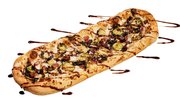Blog
5 ways to protect your brand from food-safety crises
Industry execs discussed food-safety best practices at the Restaurant Franchising and Innovation Summit in Dallas.

May 4, 2016 by Betsy Craig — pres, menutrinfo.com
The topic of food safety best practices is nothing new; however, it becomes more important for restaurant operators when chains such as Chipotle suffer from unexpected outbreaks. Because of Chipotle's recent slew of issues, restaurant operators are rightfully looking to better protect their brand reputations and their customers’ health.
I recently attended the new Restaurant Franchising and Innovation Summit in Dallas, where food-safety best practices were discussed by a roundtable of leading restaurant executives. These executives came to the unanimous decision that food safety best practices should be something each operator should own throughout their chains, regardless of unit size.
Sourcing plays a role in those best practices as it is increasingly important for operators to know and understand where their menu ingredients are coming from. Sourcing is an entirely separate topic, which I will get to in a later post. For today's purposes, my goal is to outline and discuss the top five food safety best practices as determined by Summit attendees.
Here's the breakdown:
1. Supply chain tracking: This is where transparent and legitimate food sourcing comes into play. In 2011, the food Safety Modernization Act was established to require food organizations and vendors to implement traceability procedures throughout their supply chains. By having these traceability measures in place, operators and their product suppliers have the ability to go back to the source before or after an outbreak occurs.
2. Employee training: This has been addressed so much throughout the restaurant industry yet its importance cannot be stressed enough. Employees should be trained to wash their hands after every trip to the restroom, before and after handling produce and protein products, and throughout the day in general. They also should be updated on any company's sick day policy and should be told that under no circumstances, should they report to work if feeling unwell. All it takes is one sneeze or cough to contaminate an entire storage container of food. Additionally, employees should be trained on the proper procedures for handling, cleaning and trimming food, countertops and cutlery.
3. Use approved food safety suppliers: Operational teams should do their due diligence when determining from where to source certain food products. This group can consist of local farmers or large suppliers who should all have the correct food safety protocols in place. Going off the grid to purchase certain menu ingredients may seem enticing yet the reality is it could mean big headaches down the line.
4. Have a clear food safety policy: This policy should be displayed in the restaurant where your customers and employees can see it. Your employees should be trained to know this policy by heart should they ever be asked about it by one of your customers. The policy should include your brand's food safety mission and values, and the specific measures your brand takes to ensure food safety. This will protect your brand and will work to help answer any questions your customers may have about your food safety procedures.
5. Keep ice machines clean: This may seem like a simple and unrelated food safety tip; however, dirty ice machines are a big issue in the hospitality industry as a whole. Ice machines that are not regularly cleaned can further cause the spread of E. coli, salmonella, Listeria, and a host of other bacteria. Meanwhile, microbial growth causes a biofilm buildup inside commercial ice machines. These biofilms have a shielding effect on bacteria, such as Listeria, making it more difficult to get rid of if a biofilm has grown onto the surface.
Food safety should always be at the forefront of operators’ minds, especially if they care about their brands and the customers they serve. While bacteria outbreaks such as E. coli and salmonella do occur, we can all mitigate the risks by implementing industry-wide best practices design to protect everyone involved.
About Betsy Craig
To date MenuTrinfo is responsible for menu nutritional information at over 100K US restaurants, food allergy and gluten free ANAB accredited training for hundreds of thousands of food service professionals. AllerTrain is the chosen food allergy training by NEHA providing continuing educational credit hours for those that take and pass its course. Finally, MenuTrinfo delivers food allergy confidence and allergen transparency to today’s food allergic consumer through its onsite division offerings, AllerCheck, Certified Free From allergens for spaces and food products which is an ISO 17065 certification and expert consultation and incident response support when needed.
 ChatGPT
ChatGPT Grok
Grok Perplexity
Perplexity Claude
Claude












